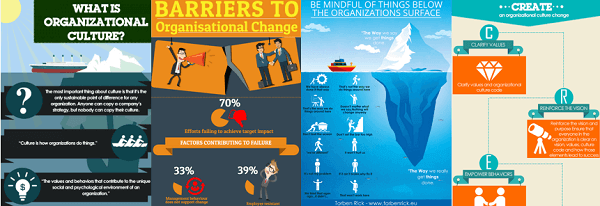Organisational culture is critical
A recent study from Booz and Company found that 84% of executives believe culture is critical to their business success while 60% of executives believe culture is more important than strategy or their operating model.
Great corporate culture doesn’t just happen – you need to make it happen. Let’s not forget: “Culture eats strategy for breakfast”
An organisation can have the finest strategy, complete with action plans, timelines and metrics, but if it is not supported by their culture – “the way things are done around here” – it will likely fizzle out somewhere along the way.
For a strategy within an organisation to develop and be implemented successfully, it must fully align with the organisational culture. Strong cultures promote successful strategy implementation while weak cultures do not. That’s why managing organisational culture has to be on the top agenda for every company.
High-performance organisations set, manage, and monitor their culture to achieve strategic objectives. They start by defining the desired culture required to enable their strategy, then define values that align with their culture and intentionally cultivate these in their workforce.
Top 4 organisational culture infographics
Managing organisational culture
Culture is the backbone of every organization. But how exactly do you create great culture?
Assess your current culture. Start by creating three lists:
- What should stay? Write down the aspects of your culture that you like and want to preserve
- What should go? Write down the aspects of your culture that must die if you are going to go forward
- What is missing? Write down aspects of the culture that seem to be missing or weak
Envision a new culture. Begin to image what could be. Imagine you are working with a blank sheet of paper and anything is possible. What would the ideal culture look like?
Share the vision with everyone. Culture will not change unless you cast a vision for something new. You have to articulate in a way that is compelling and specific.
Get alignment from your leadership team. I’m talking about more than agreement. You need alignment.
Model the culture you want to create. The culture of a company is the behavior of its leaders. If you change their attitudes, their values, their beliefs, their behaviors, you will change your culture. If you don’t, you will fail. This is why you must have alignment with your leadership team.
I think leaders should think of their culture as the first and most important business model that they create. It is the platform from which the more traditionally thought of business models emerge. A great culture enhances your ability to create great business models and execute on them too! Organisational culture, in my mind, is the single most important attribute to successful companies.
Let’s face it – great corporate culture doesn’t just happen – you need to make it happen. Let’s not forget: “Culture eats strategy for breakfast” – Good luck!
Short URL & title:
Organisational culture is critical – Managing organisational culture — http://www.torbenrick.eu/t/r/nbk
Share it:
If you enjoyed this article, please take 5 seconds to share it on your social network. Thanks!








I agree that culture is a very important aspect of business strategy and performance. I am thinking the approach to develop the organizations culture, like the approach to develop the company strategy, should not be top down, but rather a process of broad involvement. A process of broad involvement is much more likely to develop a winning, sustainable strategy and business culture.